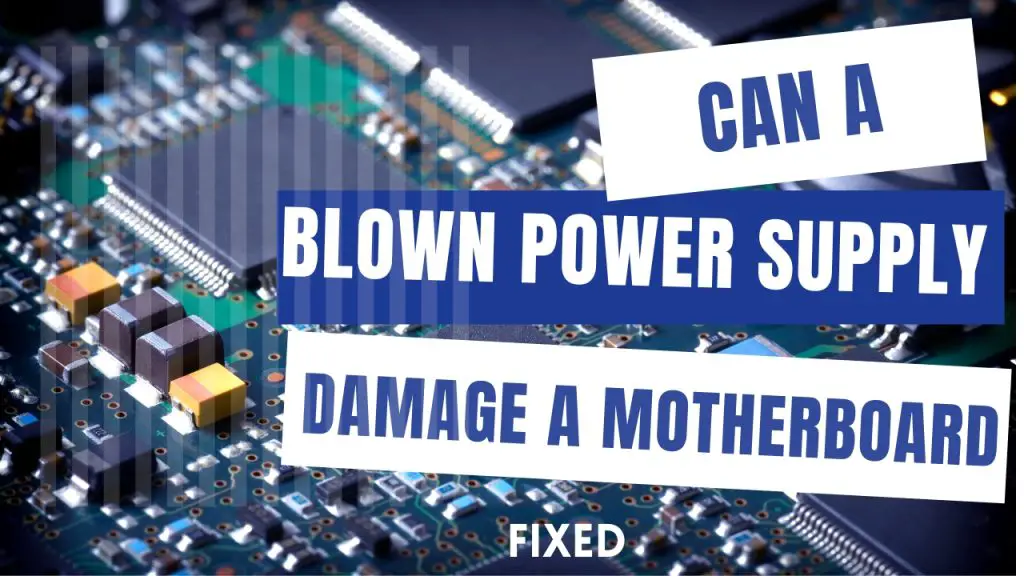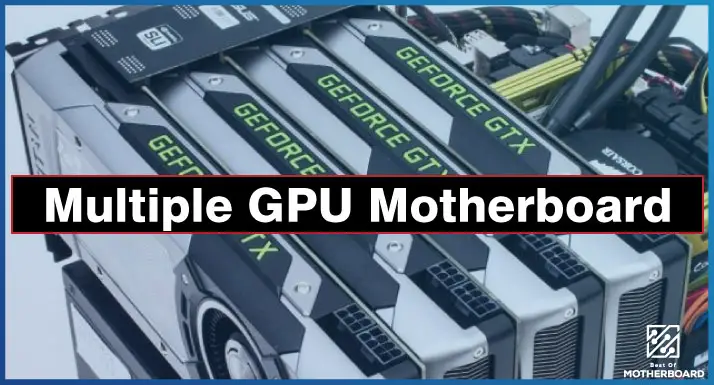Yes, a blown power supply can damage the motherboard. The power consumption of your motherboard ranges between 50 and 150 watts, the processor requires between 80 and 140 watts of power, and the GPU requires approximately 150 – 220 watts; if the PSU surges and provides more or less power than these components require, they will most likely blow out and fail.
The power supply and motherboard are two essential parts of your computer. These two items are connected, and the motherboard cannot work without the power supply. If the PSU is bad, your motherboard is not safe.
This blog will explain everything you need to know about your motherboard and power supply. Continue reading.
Can a blown power supply damage a motherboard?
Yes, a blown power supply can damage a motherboard. While it is essential to buy a quality PSU, any power supply is prone to failure. It is better to get a quality power supply than a cheap power supply that is not as reliable as a quality power supply.
If you spend a lot of time on your computer, you might want an excellent cooling system for your PSU because it can become problematic when it gets too hot. Also, a power surge can cause your computer to get too much current than is needed and therefore get damaged.
What Happens If A Power Supply Fails
If a power supply fails, the powering system will also shut down, and the PSU may damage components inside the system. This can lead to several problems, including data loss, system crashes, and hardware damage. In some cases, a power supply failure can even cause a fire.
For this reason, it is essential to have a backup power supply in place in case of a power failure. This is especially useful with laptop batteries.
Backup power supplies can provide power for a short period, long enough to save data and shut down systems properly. They can also provide power for a smooth transition to another power source.
What Causes Power Supply Failure In A Computer System?
A short circuit is one of the most common causes of a power supply failure in a computer system. This can happen when the power supply is not adequately cooled and the electrical components overheat. If the power supply is not properly cooled, the parts will eventually fail, and the system will lose power.
Another common cause of power supply failure is an electrical surge. This can happen when there is a sudden increase in electrical currents, such as during a thunderstorm. An electrical surge can damage the power supply and cause it to fail.
Finally, a power supply failure can also be caused by a manufacturing defect. Sometimes, the power supply may be faulty and eventually fail. Here are more causes of a power supply failure in a computer system:
- Age of the PSU: if the PSU is old, it is prone to damage anytime
- Dirt
- Electrical interference: voltage fluctuation, power spikes, and lightening can damage PSU
- Overheating without proper cooling or poor ventilation
Symptoms Of Failing Power Supply
A failing power supply is one of the most common causes of computer problems. If you are experiencing strange behaviors on your computer, you should check your power supply for signs of failure. Here are some common symptoms of a failing power supply:
- Random shutdowns
- Smoke
- Overheating of PSU
- The electrical shock when you touch the metal part of your computer
- Inability to boot up
- Blue screen of death
- Slow performance
- Freezing and crashing
- Strange noises
If you are experiencing any of these symptoms, you must check your power supply as soon as possible. A failing power supply can damage your computer and lead to costly repairs. Also, make sure to change the power supply to prevent expensive damage.
How Can You Prevent Your PSU From Being Damaged?
One of the best ways to prevent your PSU from being damaged is to clean it regularly and ensure that the ventilation is unobstructed.
PSUs tend to build up a lot of dust and other debris over time, so it is essential to keep them clean. You should also avoid placing your PSU near heat sources, which can cause premature damage. Here are some other ways to prevent your power supply from being damaged:
- Ensure the supply circuits are correctly grounded
- Always verify electricity levels
- Undervoltage protection
- Do not overload the circuits.
- Use a UPS or surge protector to prevent the electrical surge from causing problems for your PSU
- Replace faulty or damaged UPS or surge protectors
- Provide correct cooling for your PSU
- Do not use your computer during a storm
- Install a whole home surge processor
- Maintain proper insurance
Can A Power Supply Ruin A Motherboard?
The short answer is yes, a power supply can damage a motherboard, but it isn’t peculiar. Here is a more detailed explanation.
A power supply converts AC power from the wall into DC power for your PC. This DC power is then distributed to the various components in your PC, including the motherboard. The motherboard spreads power to the CPU, RAM, and other parts.
If the power supply is not providing enough power to the motherboard, it can cause the motherboard to fail. This is why it is essential to ensure you have a good quality power supply that can provide enough power to all the components in your PC.
It is also important to note that a power surge can damage a power supply. That is why you should protect your PSU with a power surge protector.
Can a blown PSU damage other components?
A faulty power supply unit (PSU) can cause damage to other components in your computer. A power supply unit contains several capacitors that store electrical energy.
These capacitors can suddenly and unexpectedly release their stored energy when a power supply fails. This can harm other computer components, such as the motherboard, graphics card, and storage drives.
If you suspect that your power supply has blown, you must immediately turn off your computer and unplug it from the power source. It would help if you then replaced the power supply.
How Do I Know If My Motherboard Or Power Supply Is Bad?
If your computer isn’t getting enough power, it could be due to a faulty motherboard or power supply. But how do you know which one is causing the issue? You can use a multimeter to test your power supply.
First, ensure that the multimeter is calibrated correctly. Then, insert the multimeter’s red probe into pin 10. Turn on the computer. The multimeter should measure between 11 and 12 volts. If it reads more than 12 or less than 11, the power supply is faulty and must be replaced.
Inspecting your motherboard and power supply for signs of damage is another way to test them. Look for anything that is burnt or discolored.
If you are still unsure which component is causing your computer’s power issues, you can try replacing both the power supply and the motherboard.
Can an inadequate power supply unit damage a GPU?
A faulty power supply can harm a GPU in a variety of ways. First, the GPU will not function properly if the power supply is insufficient. This can result in artifacts, crashes, and other issues.
Second, if the power supply provides too much power, the GPU can overheat and damage the sensitive components. Finally, if the power supply is of poor quality, it can cause the GPU to malfunction.
Can a weak power supply damage the GPU?
An inadequate power supply can harm a GPU in a variety of ways. For starters, it may cause the GPU to overheat because it will not be able to provide enough power to keep the GPU cool. This can cause permanent damage to the GPU.
Second, a faulty power supply can cause GPU instability, resulting in crashes and artifacts. Finally, a weak power supply will cause the GPU to underperform because it will not be able to provide enough power for the GPU to reach its full potential.
Conclusion
In conclusion, a blown power supply can damage a motherboard. This is because the power supply provides power to the motherboard, and if it is not functioning correctly, it can cause the motherboard to overheat. A blown power supply can also damage other computer components, such as the CPU and GPU.



![What Are Motherboard Standoffs? [Guide] 4 What Are Motherboard Standoffs](https://bestofmotherboard.com/wp-content/uploads/2022/01/What-Are-Motherboard-Standoffs.jpg)
![Does it Matter Which PCIe x16 slot I Use? [Guide] 5 Does it Matter Which PCIe x16 slot I Use](https://bestofmotherboard.com/wp-content/uploads/2022/01/Does-it-Matter-Which-PCIe-x16-slot-I-Use.jpg)